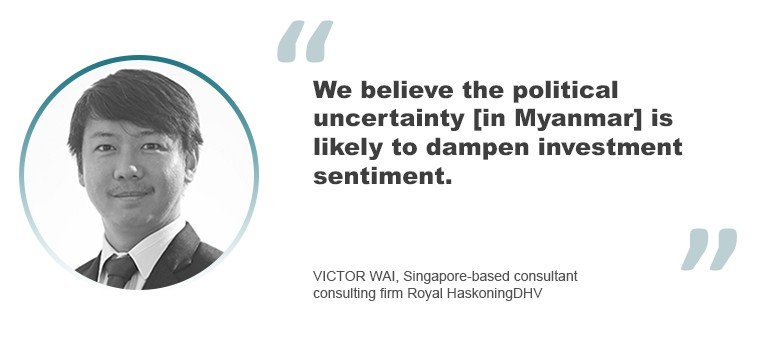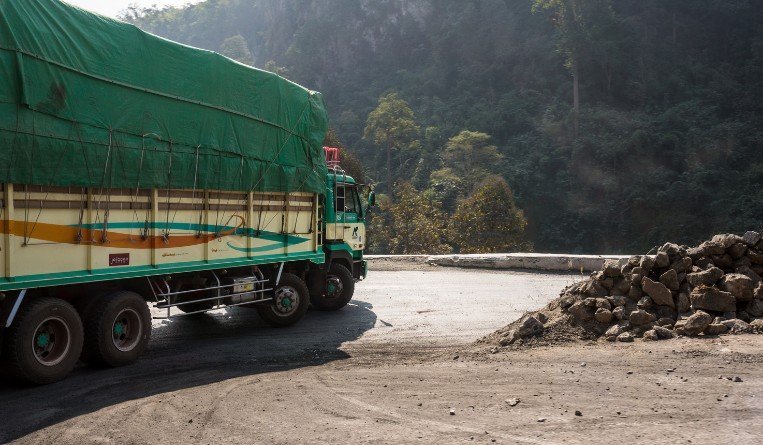Moving goods in to, out of and around Myanmar has become a lot more fraught since the February 1 coup triggered a tsunami of problems for businesses in the Southeast Asian country.
Across-the-board problems for Myanmar which, like its neighbours, is also battling Covid-19, include protracted disruption of both the banking sector and internet connectivity: “This is a huge knock to e-payment systems,” Vicky Bowman, director of the Myanmar Centre for Responsible Business, told a recent webinar. Myanmar’s kyat has also fallen by 20% against the US dollar, and fuel costs have risen by nearly a third, Bowman added.
Despite these problems, some parts of the supply chain, ports especially, are still working, although showing the cost of a tense and sometimes violent crisis. Other parts of the supply chain have ground to a halt amidst a great deal of uncertainty over the future of the country and its economic potential.
Road, important in Myanmar given the limited rolling stock and the ongoing strike by railway workers, is a big weakness.
“The problem is a lack of truck drivers. Many drivers have been spooked by the military crackdown against protesters and have retreated home to their villages. There are plenty of trucks, but nowhere near the drivers needed to drive them,” Paul Apthorp, now a consultant and former vice chairman and founder of the Greater Mekong Freight Transport Association (FRETA), told Asia Cargo News.
“Contract rates have gone. It is now like it is with a sea freight container. You have to pay what they want,” Apthorp added. “This has resulted in many running back empty as the rates mean they don't have to queue for low-rated back loads.”
A more disturbing issue on the roads is the security situation. Bombings and shootings are part of the problem, but a more regular problem is delays and longer journeys for drivers because of increasing numbers of check points.
Trains in Myanmar are unable to make up the difference; the already-limited rolling stock is not being moved much, as one hallmark of what is effectively the population’s revolution against the military takeover has been: strikes. Railway workers have been leaders in this, even to the point of eviction and beyond.
Where things still move is the ports, although here an already low base looks likely to contract even further as fears about Myanmar’s long-term future grow. (And that market is small. Maersk and Sealand Maersk have an annual volume in Myanmar of about 200,000 TEUs in a normal year, a spokesperson told ACN – not what would normally be expected from a megashipper.)
For example, Thailand-based Regional Container Lines (RCL) had two services to Myanmar, but stopped both services when the demand in the market dropped precipitously due to the February coup, a senior official with the shipper told ACN.
The line is also cautious about when those calls will restart.
“We observe the market demand for Myanmar recovers gradually recently and expect the recovery of foreign trade will continue slowly in the rest of this year when people in Myanmar get used to the political situation of the coup,” the RCL official said.
Maersk, by contrast, offers a bit more optimism and some more details about what is going on.
“The market has picked up since April. We see a healthy increase for both inbound and outbound. In-fact, the agricultural commodities have seen healthy growth. Garment exports have picked up again, although the typical peak season is impacted due to the challenges we saw earlier in the year,” Kinjal Pande, Maersk Myanmar country manager, told ACN.
“While cargo movement in and out of Yangon is smooth, the ongoing global challenges around space and equipment availability for long-haul trades continues to also impact the shipping lines, and hence Myanmar trade to an extent,” Pande added.
“For rest of the year, we would expect the trade continuing to pick up, albeit slowly. Garment exports is typically big out of Yangon, however, due to combined reasons of global pandemic impacting purchases in European and US stores and the Myanmar crisis, the market will not witness a proper peak that we normally see from May to September,” she added.
While there is talk of civil war, many more worry an ongoing stand-off, one possibly marked by various insurgencies and bouts of violence, will keep the country poor and underdeveloped for many years.
“We believe the political uncertainty is likely to dampen investment sentiment,” Victor Wai, a Singapore-based consultant at Royal HaskoningDHV, told Asia Cargo News.
This means the problems Myanmar has – and was only starting to deal with – such as poor, old and overworked infrastructure, as well an undeveloped trade policy, will now be well down the agenda and likely to remain that way for some time.
“Port congestion is a perennial issue in Myanmar. The congestion stems from an imbalance of cargoes and a lack of infrastructure spending, particularly on deeper-draft facilities and road connectivity to the port,” said Wai.
The biggest problem over time might not be civil war or more insurgents in Myanmar a country where there are already a large number but the lost opportunity of being able to put right what has been a known but not addressed problem for many years.




